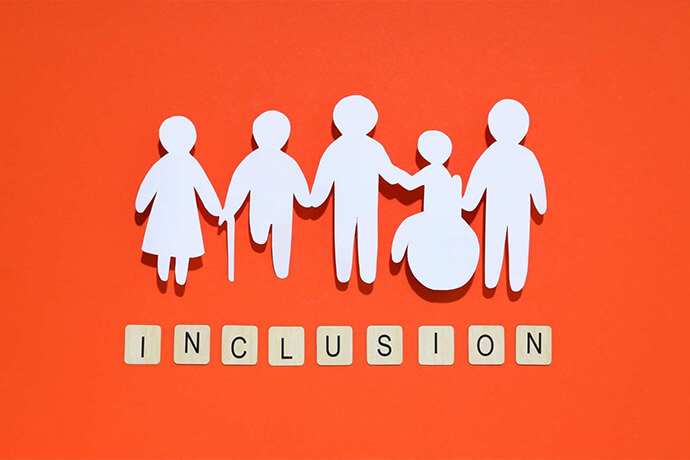 SPEAKERS
SPEAKERS
 TOPICS
TOPICS
Diversity and inclusion in the workplace helps businesses perform better and be more innovative. Find out how.

Diversity and inclusion in the workplace means that the organization employs a team of people that's diverse and reflective of the society within which the business exists. Diversity takes into account all the elements that make individuals unique, based on certain social categories. There are certain social categories that people have divided themselves into in the context of the larger society. These categories include gender, race, age, culture and so on.
Diversity and inclusion meaning is that the organization includes people in its workforce who come from various social categories. Historically, there was discrimination in hiring practices in countries over the world. Over the years, diversity and inclusion has taken center stage. In today's world, business leaders hire people from different social and cultural backgrounds based on their skills and talents only.
Diverse teams tend to be more creative. This is because the individual creativity of a person is enhanced by the ability that they have to integrate different points of view. This is something that people naturally learn while interacting with people who come from different backgrounds.
Multicultural experiences can drive creativity. Workers will be able to draw inspiration from places that are seemingly unrelated. The multicultural perspectives that workers are exposed to in inclusive workplaces affects their perspective at work. They are about to take into account different perspectives and integrate this information into their creative processes. This helps them be more creative at work.
In addition to this, people from different cultural backgrounds have different creative influences that they can bring to the table. Team members are exposed to these different cultural experiences that expands their worldview and introduces them to new kinds of creativity. Find out more from our diversity speakers.
The diversity and inclusion meaning suggests that people should be hired by organizations irrespective of their socio-cultural backgrounds, genders and other differentiating criteria. In the modern world, diversity and inclusion both matter in the workplace. These are critical for building a work culture that allows employees to feel valued as well as welcome. It enables them to make better decisions which can then go on to help the business improve its financial performance.
When employees find themselves working with people who are different from them, this can challenge their brain to develop new ways of thinking. The brain becomes sharper and individuals learn different perspectives. A team that's diverse is also more likely to be aware of its weaknesses. They will process information more carefully, reexamine the facts at hand, and stay objective. Diverse groups are also able to diminish personal biases and not let those thoughts affect them at work.
People have different talents and their talents are not always linked to their personal backgrounds. Hiring or not hiring someone based on anything other than their resume and experience can be a bad idea. This is why businesses strive to be more inclusive in the modern world.
People from under-represented classes and backgrounds now find themselves at work, offering their skills and talents to the business that hired them. The pool of talent that a business can hire from has grown in number since inclusivity became commonplace. A diverse talent pool allows businesses to hire people that can best help them achieve their goals.
When a business adopts diverse and inclusive hiring practices, they build a collaborative environment that attracts the best talent. The business is also better able to retain the talent that they hire.

There are several diversity in the workplace benefits that businesses enjoy when they hire people solely based on resume and not their personal backgrounds. Cultural diversity st work means the development of a workforce that is comprised of employees from different cultures. These employees are valued and given respect on the basis of their skills and not factors like their gender, skin color or nationality.
To create a workplace culture that is inclusive involves more than just hiring people from different cultural backgrounds. It also involves making them feel valued within the organization. Businesses can even leverage the diversity within their pool of employees to build a collaborative workforce that feels empowered to help the business reach its goals.
Business leaders should seek ways to find ways to value their employees - from commending them when they do something well, to trying to learn their perspective from them.
There are no universal set of metrics that can help businesses measure how diverse and inclusive their workplace is. Businesses will need to take a personalized approach in order to decide which metrics they personally want to measure. One place to start, when it comes to choosing which metrics to measure, is what the goals of the business are. Are the employees helping the business reach its goals?
Another way to measure diversity is by looking at demographics. What gender are your employees? What is their race? Their age? Their ethnicity. You can even look at the number of languages that are spoken by your employees. For a workplace to be considered inclusive, there should be people from various backgrounds working together. A diverse workplace exposes your employees to new ways of thinking and encourages better team building and collaboration.
If you do find, after measuring how diverse your workplace is, that it isn't diverse enough- this is a sign to change your hiring practices. Measuring diversity and inclusion is important because it tells you whether your business is adopting modern hiring standards and practices, and whether your workplace is truly inclusive.
People often have various questions on what diversity and inclusivity are and how they apply to the workplace. These are the most common questions that people have, when it comes to diversity at work.
What are the benefits of diversity in the workplace?
There are tangible diversity in the workplace benefits. A workplace that's diverse is more likely to have employees that learn from a wider range of perspectives. The pool of talent that is hired is more diverse, allowing employees to understand diverse customers better as well.
Problem solving becomes easier and faster, which can in turn improve the overall performance of the business. Diversity in the workplace training can sensitize both employees as well the management on the importance of an inclusive workplace. A diverse and inclusive workplace is also seen as one that adopts the modern zeitgeist and this can improve the overall reputation of the business. Customers respond positively to diversity.
Employee engagement can be improved and it will be easier to hire top talent, when factors like gender, sexual orientation, skin color and more, are not preventing people from getting hired.
What is the meaning of diversity and inclusion in the context of the workplace?
In the context of the workplace, inclusion and diversity refer to the hiring of talent from various socio-cultural backgrounds. They are not barred on the basis of factors like their gender or race, but are rather hired based on what talent they have.
Diversity and inclusion training can help business leaders sensitize themselves and improve their hiring practices. A workplace that is diverse is one that's more collaborative, innovative and productive. Employees from different socio-cultural backgrounds bring in their experience and expertise. Diverse workplaces show more creativity and are more likely to be a positive work environment as well.
How does diversity positively impact organizational performance and innovation?
Diversity and inclusion in hiring practices allows businesses to attract and retain top talent. This allows the businesses to flourish and improve their overall performance. A diverse workplace is also one where employees are exposed to a wide range of perspectives. They become more open minded and are open to new thoughts and opinions. This is directly responsible for driving innovation in the workplace.
The performance of the organization improves as well, as a diverse company culture is positive and productive. Employees work together to find creative ways to help the business reach its goals. Diversity and inclusion have a positive effect on the workplace, turning it into a collaborative environment that positively affects employees.
How can organizations cultivate a diverse and inclusive work culture?
Diversity in the workplace training can enable organizations to cultivate an inclusive work culture. Compared to diversity in the workplace challenges, the benefits that diversity and inclusion brings far outweighs the negatives.
Organizations can cultivate a work culture that is diverse by first and foremost improving their hiring practices. Seek top talent irrespective of their personal backgrounds and invite them to work for your business. Measure how diverse your workplace is by looking at the demographics of your hires. If it isn't inclusive enough, consider hiring new employees that make your workplace more diverse. Diversity and inclusion bring with it many benefits, such as making your business more innovative. Customers also respond well to businesses that are inclusive. Learn more about diversity and inclusion from top experts like Roy Gluckman, Ryan Zaman and Hayley Barnard.
Tumi Sotire, Toju Duke and Lee Chambers are other diversity speakers that you should consider hiring.
